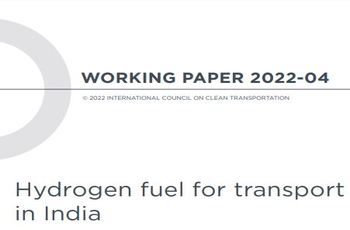Research Papers/Articles
Climate and Environmental Impacts of Automated Minibuses in Future Public transportation
2022
Author(s): Huber D, Viere T, Nemoto EH, Jaroudi I, Korbee D, Fournier G
This paper analyses the environmental impacts of electric automated minibuses operated in public transportation systems. The results are based on an environmental life cycle assessment study, which uses data from a minibus producer and field data from several European cities.
Benefits of Electrifying App-Taxi Fleet – A Simulation on Trip Data from New Delhi
2022
Author(s): Rajagopal D, Sawant V, Bauer GS, Phadke AA
Battery electric vehicles (BEVs) look to be critical to improving urban air quality, particularly in less-developed countries where cities are among the most polluted and fastest developing. However, despite sharp price drops in batteries and generous subsidies, BEV adoption in these countries remains low.
EVs Are Fast Winning Over the Hesitant Buyer. Better Charging Infra Will Accelerate It Further
2022
Author(s): Shankar A.
To save mankind from the impending disaster of global warming, the transition of transport away from fossil fuels is critical. The International Energy Agency (IEA) Report of last year on the feasible pathway to net zero by 2050 and restricting global warming to 1.5 degrees envisages the complete switchover in the world to EVs by 2035 and of electricity systems phasing out fossil fuel use around the same time.
How Delhi is Becoming a Lighthouse City for Electric Mobility in India
2022
Author(s): Bhatt A
Most state EV policies have focused on the supply side approach. However, production of vehicles is also linked to their demand, which is where Delhi has innovated.
Comparative Assessment of Zero Emission Electric and Hydrogen Buses in Australia
2022
Author(s): Hensher DA, Wei E, Balbontin C
The pace of direct electrification vs indirect electrification for public transit bus fleets is accelerating internationally. Clear targets have been established by transport policymakers to achieve a zero-emission bus target as early as 2030 in some jurisdictions.
Equity Issues Associated With U.S. Plug-In Electric Vehicle Income Tax Credits
2022
Author(s): Liu H, Dai Z, Rodgers MO, Guensler R
This research evaluated the accessibility of federal- and states-level PEVs Income Tax Credits (ITC) policy in the United States, and identified potential barriers for households with diverse income levels, family types and number of children in participation.
Geofence Planning For Electric Scooters
2022
Author(s): Liazos A, Iliopoulou C, Kepaptsoglou K, Bakogiannis E
E-scooters have emerged in recent years as an innovative and user-friendly transportation mode in urban areas worldwide. These systems offer short-term rental of vehicles with various return locations, thereby providing mobility when public transport or vehicle ownership are not a sufficient option.

The authors analyzed two hydrogen production pathways that could have significant potential in India: green hydrogen produced via water electrolysis powered by solar electricity and “blue” hydrogen produced from natural gas combined with carbon capture and storage. The study assumed the hydrogen is delivered via pipeline.
Going Electric: Environmental and Welfare Impacts of Urban Ground and Air Transport
2022
Author(s): Straubinger A, Verhoef E T, de Groot HLF,
Electric mobility is often seen as an essential part of the solution, as en-route emissions immediately go down. This is especially true in urban environments, where technological solutions for electric transport are already available.
How Does the Suspension of Ride-Sourcing Affect the Transportation System and Environment?
2022
Author(s): Yang H, Zhai G, Yang L, Xie K
The rapid development of ride-sourcing services has raised a lot of debates among government agencies and researchers. On the one hand, supporters claim that ride-sourcing services could offer a more reliable and economical transportation option than traditional taxi services, reducing private vehicle use, car ownership, and vehicle emissions.



